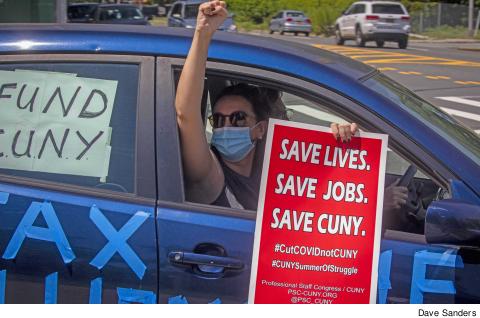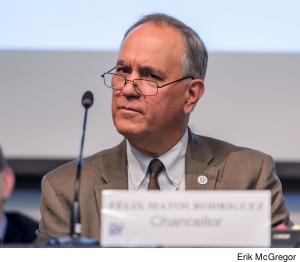Resisting CUNY austerity
 |
The union has a plan to fight to save lives, save jobs and save CUNY. And that plan starts with you.
CUNY faculty and staff – as well as students – are facing an enormous crisis in public higher education in New York State. “CUNY management has already shown under Chancellor Félix Matos Rodríguez that it is all too ready to treat adjunct colleagues as disposable,” PSC President Barbara Bowen told members.
MEMBER INPUT
The union’s plan for the months ahead is based on member involvement. Chapter leaders, delegates, organizers and rank-and-file activists plan to have one-on-one conversations with members in every chapter about the crises facing our membership. With member-driven involvement, the union is fighting against increasing class size and unsafe campus reopening. With member-driven involvement the union is building a coalition of unions and community groups to pressure the governor into accepting the growing demand to raise taxes on the state’s super-wealthy to not only avoid further budget cuts but to increase funding to vital state institutions like CUNY. All around CUNY, PSC chapter leaders are talking about their anger toward an administration and a state that appears to care little about students, faculty and staff. The good news is that PSC organizing is turning that anger into action.
Already, the union has used court action, impact bargaining, political lobbying and grievances to fight on all of these fronts. But it’s only the beginning.
The pandemic’s toll on American academia cannot be understated. The New York Times reported in October, “As it resurges across the country, the coronavirus is forcing universities large and small to make deep and possibly lasting cuts to close widening budget shortfalls. By one estimate, the pandemic has cost colleges at least $120 billion.” The report also said, “Even before the pandemic, colleges and universities were grappling with a growing financial crisis, brought on by years of shrinking state support, declining enrollment and student concerns with skyrocketing tuition and burdensome debt.”
CHRONIC UNDERFUNDING
 |
CUNY faculty and staff know this well. PSC has fought against what it has called the state’s underfunding of CUNY in the years leading up to the current crisis. Union research shows that state funding per student for the senior colleges has fallen 21% since FY 2009, adjusting for inflation. PSC Legislative Representative Mike Fabricant told Clarion earlier this year that the 2020 state funding plan for CUNY “reflects the decline in state investment over the last decade.” The governor has resisted calls to increase taxes on the wealthy in order to fully fund state services. As the pandemic has raged, the union has fought for the safety of all members and negotiated with CUNY over the impact the pandemic has had on members’ contractual protections. Activists are confronting ballooning class size at several campuses as classes have moved online. The administration has cited fear of impending budgetary constraints to lay off nearly 3,000 adjuncts, despite obtaining federal stimulus money meant to keep such workers employed, and the union is fighting against this, too.
While further cuts to CUNY may be on the way, PSC members are energized to fight back against this austerity and, beyond that, to fight against the chronic underfunding of CUNY that started long before the pandemic and subsequent economic downturn. At a digital mass meeting on October 29, PSC leaders and rank-and-file activists outlined the problems facing members and how to fight back.
Luke Elliott-Negri, a PSC executive council member, explained that the state’s budget this year granted Governor Andrew Cuomo the power to withhold funding unilaterally for state agencies and others. “He’s holding back 20% of the state allocation,” Elliott-Negri said of the governor. “Rather than challenging the withholding, the CUNY administration has laid off faculty and restricted hours of adjunct CLTs.”
The union sued CUNY to stop the layoffs this summer, arguing, as the New York Daily News reported, that the cuts violated “an obligation to use funds from the federal CARES Act to try to keep employees on the payroll amid the pandemic.”
The union was not granted the preliminary injunction it sought to stop the layoffs, but the issue remains in litigation. Union pressure succeeded in winning back some adjunct jobs, but the union continues to try to get the rest rehired. Elliott-Negri added that the union leadership fears that the cuts could remain beyond the COVID-19 crisis. “This 20% withholding could set up permanent withholding,” he said.
TAX THE RICH
The PSC has joined other progressive unions and activist organizations demanding that the state’s budget woes be addressed by taxing the state’s wealthiest. “We are supporting incumbents who are supportive of raising revenue,” said Andrea Vásquez, the PSC’s first vice president. “We currently have 14 revenue-raising proposals. Fifty billion dollars could be raised per year, if these are passed.”
Fabricant told members about the union’s campaign for a New Deal for CUNY, what he called a “back-to-the-future” piece of legislation.
“We’re demanding free tuition, that’s back to the 1970s. We’re demanding 5,000 new faculty members, which brings us to the same number we had in the 1970s,” he said of the proposed legislation. He continued, “We’re looking for the kind of advising students need [in order] to graduate on time. We’re also calling for parity for part-time faculty, and a capital budget that meets the needs of our students.”
ACTION AHEAD
Legislative action is only part of the union’s struggle. In several instances, including at Hunter College Campus Schools, the union has had to use militant action (including a strike authorization vote) to resist unsafe campus reopening plans. The union is calling on activists to bring grassroots organizing to assess where each member stands and our readiness for action.
Members are the backbone of any union. Expect to hear more from your chapter leaders and organizers about these campaigns to come. The union is making an effort to have a face-to-face conversation with all members to ensure that everyone has a chance to do their part in this historic moment.
“We need to talk to every single one of our colleagues,” Elliott-Negri said.

